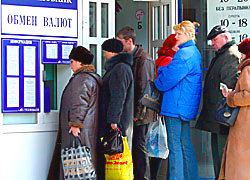Belarus will devaluate national currency following Russia and Kazakhstan
101- 12.02.2014, 8:17
- 152,632

The devaluation of Russian and Kazakh currencies will cause the weakening of Belarusian rouble by 10-15%.
At night on Tuesday Kazakh authorities lowered the exchange rate of the national currency by almost 20% at once. Among the reasons for the devaluation Kazakhstan’s National Bank names the weakening of Russian rouble as well as the necessity to reduce imports and support the competitiveness of domestic producers. First to suffer from tenge’s devaluation will be Russian economy, which will see reduced exports to Kazakhstan and simultaneous growth in volumes of imported Kazakh goods. Belarus too will suffer losses, and will probably have to devaluate its own currency too, following Russia and Kazakhstan, Nezavisimaya Gazeta reports.
Russia is Kazakhstan’s largest trading partner accounting for 18.5% it its trade turnover. In these conditions there is nothing surprising that following Russia Kazakhstan too started its own devaluation war. At the same time the country’s authorities do not conceal that these were the growth of imports and weakening of Russian rouble that pushed them to the decision to promptly devaluate tenge’s exchange rate. In official statements Kazakh authorities name five or even six reasons for the devaluation. Among them there are the increased pressure on the currencies of developing countries due to the USA’s tapering of quantitative easing, which caused capital outflow to developed economies. But the tapering of quantitative easing in the USA was announced months ago. Why is it only now that Astana decided to sharply change the exchange rate of its currency? Experts believe that it was the policy of Russian Central Bank that pushed Kazakhstan towards devaluation. In the statements of the Kazakh party it is directly mentioned that an important reason for the reconsideration of their currency policy were the actions of Russia. “Uncertainty remains as to the exchange rate of Russian rouble. As a result of Russian Central Bank’s transition towards a freer exchange rate formation Russian rouble lost 7.1% against the US dollar in 2013. In January this year the weakening trend continued”, - comments of Kazakh bankers read. At the same time the authorities point at the “necessity to restore tenge exchange rate’s foreign competitiveness, the country’s foreign trade balance and support the competitiveness of domestic producers”, which should be achieved by Kazakhstan’s new currency policy.
Yesterday the coutnry’s National Bank announced that starting from 11 February it would refuse from supporting the exchange rate at the current level, would reduce the volumes of currency interventions and would reduce its involvement in the forming of tenge’s exchange rate. “The National Bank assumes that the new exchange rate level would establish at about 185 tenge per US dollar”, - the bank’s statement says. The official rate on 11 February was established at the level of 155.5 tenge per US dollar.
In the meanwhile the Russian government promises to analyze the neighbor’s decision. “This should be analyzed. But Kazakhstan’s main export goes far abroad. Apart from that for Kazakhstan large share of imports is a significant problem, not as much from us as from Belarus and China. In this sense tenge’s devaluation will support Kazakhstan’s competitiveness in food industry and light industry against Belarus”, - the deputy head of Russia’s Ministry for Economic Development Andrei Klepach claimed yesterday.
“Kazakhstan’s decision could be perceived as a shot in a “currency war”, at least on the local scale”, - UFS IC’s macroeconomic analyst Stanislav Savinov says. Experts believe that the devaluation war may bring benefits to Kazakhstan. “This is an outstripping game. Kazakhstan does not want to wait for the national economy to abruptly slow down and is ready to let tenge’s exchange rate go. After the devaluation Kazakhstan’s exports may grow due to the increased competitiveness of domestic producers”, - the analyst of Finam Holding Anton Soroko believes.
“Tenge’s devaluation is another part of the puzzle called “war on developing countries’ currencies”. It is not ruled out that next to decide to take a similar step would be Belarus. On average Belarusian rouble may lose 10-15%”, - assumes a senior analyst of the Alpari company Hanna Badrova. “Belarusian currency looks most vulnerable”, - agrees the head of the analytics department of Russ-Invest Dmitry Bedenkov.









